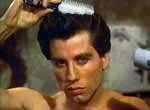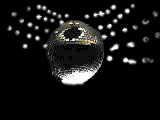 |
|
It's 1977 and I'm waiting for the bus home having just watched The Vibrators (maybe) at- Aylesbury Civic Centre when around the corner comes a twenty-strong posse of Soul Boys out to stick their platforms into any punk they can find. I begin to quake in my black suede Johnsons shoes. They approach, circling, looking for tell-tale signs like a safety-pin, torn clothing or a tiny badge which simply says 'Punk'. No chance. My take on rebel, rebel sartorial splendour is rooted in something far more advanced, ie, a potent mix of Aladdin pegs and a mohair jumper. The bloodthirsty hounds of hatred don't get the scent they're so eagerly sniffing for. They walk off. I am, to put it mildly, relieved. I had escaped the fate of those who wore their rejection of straight society so obviously on their sleeves - ie, a good kicking. Had I been able to make a Trans-Atlantic trip In the time it took The Ramones to play 'Sheena Is A Punk Rocker', I might have found myself in the queue outside Manhattan's Studio 54 on West 54th St. Doorman and 'picker'. Marc Beneke, would eye me up and down with a view, not to hospitalisation, but either lifting the rope that separated the 'in' crowd from the 'out In the cold' rejects, or passing me over. I like to think I'd have gained entry into the magic palace filled with Beautiful People. If I had, I might have seen Mick and Bianca! Farrah! Lisa! Warren! Any number of Stars amid the baroque fittings, neon wheels and aluminium strips. A 5,400-Square-foot dance floor and strobe lights! Wowee-zowee. Alas, I simply fantasise. Studio 54, apparently did not admit 'singles'. And besides, destiny determined that my experience of Disco was lit by the red, green and yellow blip of cheap lighting courtesy of a mobile dee-jay. That and the more than substantial whiff of violence. Punk UK on a tiny island taken by the stormtroopers of Disco and rock deviance - Dangerous? You bet, but like other broad-minded types I maneuvered between the opposing armies' outwitting would-be attackers with copies of Penetration and Parliament records. Meanwhile, Ted's chased Punks up end down the King's Road and into the tabloid newspapers, whilst Trad Rock-types dissed Punks who dissed Disco and they all turned nasty on each other. 'Disco Sucks' became common writing on the walls. The old Guard moaned about what the new kids were doing with that sacred instrument, the guitar. "They can't play!" And da punks really thought they were bringing it all down - Rock, The Government, Racism, all the evils of the world. But Disco took the biscuit. Disco was the Big Thing which succeeded in revolutionising sound and upsetting everyone by the very nature of it's existence. The Eagles and Fleetwood Mac held one area. The Clash and Pistols another, and onto the battlefield pranced John Travolta in a three-piece suit for Chrissake - dancing! Oh my godÉ
'Nimble-toed melon chompers' was Julie Burchill and Tony Parsons' description of black performers on Top Of The Pops in their book, 'The Boy Looked At Johnny' (Pluto Press, 1978). (Bernard) manning the barricades against 'conformity', you might say. Supposedly 'hip young guns lingers' caught up in the Style Wars to the point of blatant racism? Looks that. way, but Jules and Tone were only trying to point out the state of Uncle Tomfoolery blacks succumbed to in the name of Disco. They were only doing what 'intelligent' honkies have always done, namely, cut down negras that don't stay in their place and 'their place'. Ironically, was the ghetto of 'credibility' according to blue-eyed purveyors of 'taste'. Sly was OK, Sylvester definitely was not. Black performers reaping the commercial crop grown from seeds sown down the years was taboo. They could be starving junky geniuses but not 'nimble-toed' top of the pop chart stars in 1977. Newfound affluence by the Afro'd ones stank of pop colonial subservience so the truly sufferin' Jamaicans were invited to the punky-reggae party. Now they really knew how to struggle, and smoke weed, and riot, and hate the police, and make records like Junior Murvin's 'Police And Thieves', as covered by The Clash. Saturday Night Fever sucked and Travolta became the symbol of hatred for all but those converted to the Saturday night cause. 21 years removed from context, we can appreciate it's place as possibly the most significant pop culture film ever made (can't we?). And despite being ethnically cleansed, homo-free and devoid of Funk, the movie was rooted in the very real experience of early seventies nightlifers such as one Eugene Robinson. Robinson was a Brooklyn delivery boy, contacted by writer Nik Cohn as source material for the New York Magazine article, 'Tribal Rites of the New Saturday Night' which, in turn, inspired the movie. For all it's sins regarding 'authenticity', Sat Night Fever's hero does eventually acknowledge racial prejudice (and in a sense, the film's own failings) when Manero hands the dance contest trophy to his obviously superior Puerto Rican opponents. The subsequent rise to fame of soundtrack contributors. The Bee Gees, remains, however, hard to forgive. White dopes on Punk and Trad Rockers aside, old school Funkateers had trouble adjusting to the super-lite ambiance, lush strings and livelier pace of Disco. It wasn't so damn funky as earlier stuff by the likes of the Ohio Players, The Commodores or the host of other black bands based firmly in the post-Sly & the Family Stone tradition. That said, the roots of Disco were clearly laid down by the greatest label of it's time, Philadelphia International. The 0' Jays' 'Love Train' and in particular, Harold Melvin and the Bluenotes' 'The Love I Lost' (1973) and 'Bad Luck' ('75) are proto-Disco par excellance, strings, bubbling bass lines an' all. Funk seeped into underground consciousness in the UK during this period. Like so many stowaways Intent on populating another land, the imports crossed the Atlantic just as their r&b brethren had done during the sixties. They found homes in backstreet clubs and were embraced by a generation weaned on older brothers and sisters' Motown Chartbuster compilations. Just as Philly records made an impact, the hippest icon of white UK rock, David Bowie, flew to Sigma studios in, where else but Philadelphia! There he recorded 'Young Americans', a session that would allow him entry, as the first white singer, into the holy land of American TV's top r&b show, Soul Train. As the album emerged in '75, the secret sect of freaky-looking Punk-lovers were forming the core of cool taste, parts of which would emerge as 'punks' within the next two years. Meanwhile, in the USA, Van McCoy's 'The Hustle' was winning a Grammy award and selling ten million copies. Not bad for a tune written in under an hour. Disco had busted loose to emerge as potent opposition to the staid mainstream rock of the Eagles, Paul Simon etc. But the next two years in Disco saw changes that would, in one sense, popularise it, and in another, send those 'in the know' either into premature Lost Youth land, or the maelstrom of Punk. Some made the transformation from black rhythm to white noise and joined in the halting of the great white-suited one, Travolta. It was that or follow clubbers who supported the emerging Jazz-Funk scene - next point of obscure import, Japan - hello Fusion, and Level 42. 1977: The Year of the Lost and Found. Disco divorced rhythm from the blues and knocked the 'k' off of Funk. Every clueless jerk who wouldn't know parliament from Peter Frampton was dancing, or worse, declaring themselves to be 'Soul Boys'. Hefty sessions down the pub, form a posse, find a solitary 'punk' and play football with his head. Disco had become, as Burchill and Parsons proclaimed, 'the opiate of the prole', very lumpen, lacking former style and significance. And The Tramps sang 'Burn, baby, burn!' on 'Disco Inferno', an ironic reference to the chant of the black militant firestarters of late-60s America. In '77, many would have liked to have seen a literal translation from word to deed. The Future of Dance that was not bleak but could not be recognised at the time lay in a weird tune produced by an Italian in Munich, Giorgio Moroder. When Donna Summer sang ' I Feel Love' to a disco-tech synthesizer rhythm, no-one could have foreseen the rise to glory, ten years later, of machine-based Dance music. Kraftwerk, at the same time, were infiltrating America via the 'Trans-Euro Express'. Their more artful take on electronica would inspire the new breed of blacks in Detroit to form their own Techno Nation in the 80s. The rest is well-known history, but the simultaneous Rise and Fall of Disco during the decade's final years still creates some confusion. Disco is either what happened after Saturday Night Fever, or before, according, perhaps, to taste. The movie acted as both rove I at ion ho those formerly entrenched in MOR rock/pop, a kind of release from all that, and a repulsive ending to what had been golden years for lovers of the black American groove thing. The demise is best represented by Kool & The Gang's output,. Always sassy, full of horn-swinging showmanship but, ultimately as funky as funky gets on early ('73) hits such as 'Funky Stuff' and 'Hollywood Swinging', they closed the decade in '79 with 'Ladies Night', an insipid, Disco-lite affair. Major funk bands followed a similar course which saw the likes of War, The Ohio Players and Earth Wind & Fire, all major players of old, reduced to ashes by the Disco inferno. It's 1977 and the secret Punk-Funk connection begins to break up beneath the weight of what would become Success, of sorts, for both. For a while, however, I'm able to sneer at the ignorant aggressors who fail to understand the importance of both The Clash and Curtis Mayfield. Safely on the bus, I become aware of the fact that there is an Enemy now, defending, ironically, a 'cause' for which I had been a crusader not so long ago. But Punk had polarised everyone and the real difference between Us and Them was that 'we' knew Those Days and That Music was being destroyed. At least, that was the feeling, albeit hard to define or understand. What I couldn't foresee was the fact that seeds sown by Disco back then would bear more amazing, more interesting fruits than Punk ever could.
Postscript What goes around, comes around. The movie, Boogie Nights, with it's carefully crafted celebration of Disco circa '77 (cue 'Machine Gun' and synchronised dancing). And the forthcoming story of Studio 54 boss, Steve Rubell, played by Mike Myers. Hollywood swinging, indeed. And media flirtations with the possible idea of one more 'Seventies revival' before the Big M. But more interestingly, progressive DJays on the underground circuit adopting the attitudes of Disco turntablists such as Tom Saverese. He not only championed, back In the mid-seventies, the notion that a DJ is more than, quote, "some guy spinning records", but asked: "If you don't notice the disc jockey, then what is the purpose of being there?". His sets differed from night to night and featured 'rock, pop, mood albums, and singles' according to Kitty Hanson's book, 'Disco Fever'. The essence of old-school Disco is, it would appear, more relevant today than it was back then .
|

